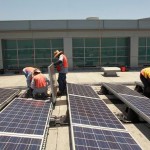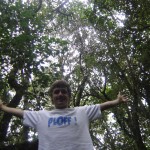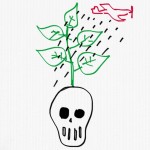The Acceptance of the Indigenous Cosmovision:
Several friends send me cool data… it is great to wake up in the morning, coffee, tea, or any infusion that covers my body and find these emails with links with information they consider relevant for this web site, for everyone, for us to know.
In this way -apart from saving time looking for news and global connectors– synergy, feedback, communication, or however you want to call this process of reaching out and talking things out, is created… by spreading the word.
One article a friend of mine sent me, shows a graph with the statistical results of a Gallup survey, where we can see that –for the North American surveyed public opinion– the economic growth is more important than environmental issues… Sad, but understandable in our species; I save myself first, and afterwards I check if I have something left to try and fix all the fuzz I made to save myself.
Now, the ecological crisis which we triggered with our extractive ways and economic productive models put to an end a vision where more rural development implied making the peasant, the indigenous people, and any person who does not have a document saying those lands belong to him, disappear. In other words, let the unproductive indigenous people stand aside from these lands, and give space to the cow ready for exportation and the de-humanizing tractor…
However, in order to surpass this crisis, we need to go back to the religious perception of nature which the indigenous culture poses intuitively throughout the world.
They are “owners of cosmovisions and cognitive models, technological strategies and social and productive organizational ways, closer to what has been visualized like a proper ecological management of nature.” – Victor M. Toledo – Utopía y Naturaleza. (Utopy and Nature) Ed. Nueva Sociedad, 1992. Page. 73
Let us not forget that a sustainable management of natural resources did exist before the colonialism processes which were portrayed in our continent. (Issues enlarged in the awareness newsletters 46 and 54). And I do not mean “management” in a technical sense of the word, but a higher concept of management. A natural symbiosis nurtured by culture.
Toledo says that nowadays 5 phenomenons exist which give more impulse to the acceptance of the indigenous cosmovision in Latin America. Read closely, because they are REAL phenomenons, but they do not have enough rating to appear in the 22 hours night shows:
1) The evident failure of the modern productive systems. You can see how, one by one, economies fall, only saved by the IMF at the very last moment in order for it to all work for a couple of years more.
2) The proliferation of techno productive lineaments emerged from ecological inspiration taken on by a new generation of investigators and scientists (US)
3) The emergence and expansion of innumerable NGO’s… The importance of this point is widely debated in chapter 8, “The economy is afraid of not being ignorant” of Ploff Awareness – Thoughts & Quotes On Our Daily Existence Insights For Social Awareness which you can download and read here)
4) The appearance of new ways of ecological economy (several times I told you that ecoportal.net gives a solid course on this matter)
5) The appearance and development of consciousness and environmental movements (here we are, after all, reading).
Toledo reminds us that Latin America is “the most humid portion of the planet, the one that embraces the biggest forests, and the one that gives shelter to the widest variety of the biology of the world”. A truthful reason to defend our place in the world.
“June 2nd. The indigenous are people.
In 1537, the pope Paulo III dictated the Sublimis Deus bull.
The bull went against those, who by willing to quench their greed, dare to say that the indigenous people must be commanded at our will, like animals, with the pretext that they ignore the catholic faith.
And in defense of the indigenous people of the New World, he established that they are true men, and as true men they can use, posess and enjoy freely and legally of their freedom and domain of their propietries and they must not be reduced to slavery.
In America, no one got the message.”
Eduardo Galeano. Los hijos de los días. Siglo Veintiuno Editores, 2012. Buenos Aires.
Huge sincere hug,
Brian Longstaff.-




















Florentina Toral Sep 05 , 2012 at 07:58 AM /
de los 5 fenomenos, el 5° es mi favorito! 🙂
Brian Longstaff Sep 05 , 2012 at 08:12 AM /
acá estamos, leyendo. =)